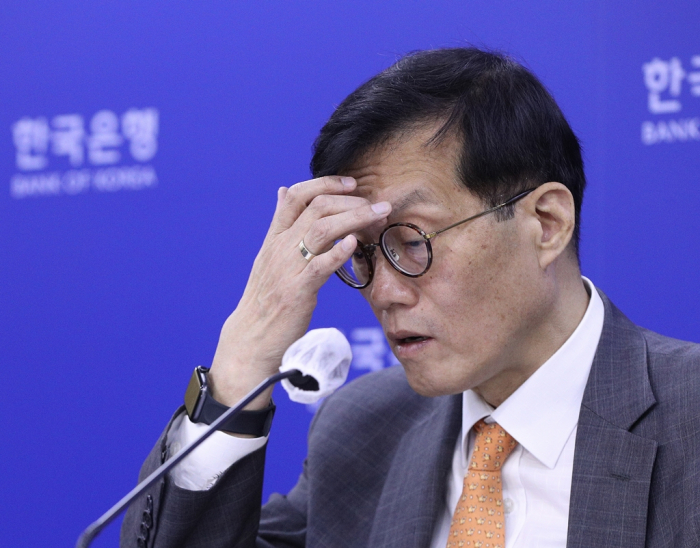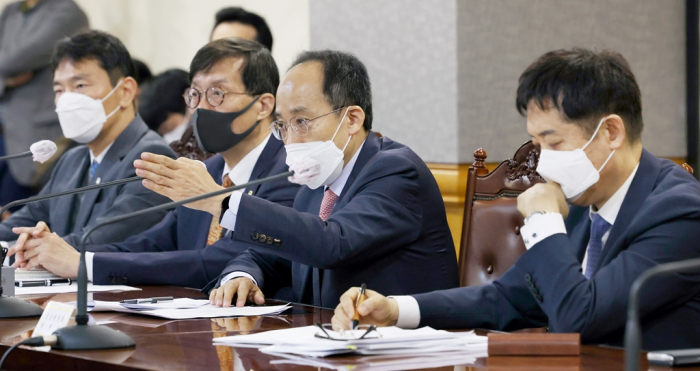Economy
Korea’s 1st export decline in 2 years dims BOK’s big-step rate hike outlook
A 50-basis-point rate increase at this year’s final rate review on Nov. 24 is unlikely given the slowing economy, analysts say
By Nov 01, 2022 (Gmt+09:00)
3
Min read
Most Read
LG Chem to sell water filter business to Glenwood PE for $692 million


Kyobo Life poised to buy Japan’s SBI Group-owned savings bank


KT&G eyes overseas M&A after rejecting activist fund's offer


StockX in merger talks with Naver’s online reseller Kream


Mirae Asset to be named Korea Post’s core real estate fund operator



South Korea’s exports fell for the first time in two years in October, posting a trade deficit for seven months in a row – the clearest sign yet that Asia’s fourth-largest economy is heading for a recession.
The weak economic performance drastically reduces the chance of the country’s central bank taking another big-step rate hike at this year’s final rate review slated for Nov. 24, analysts said.
Korea’s exports fell 5.7% from a year earlier to $52.48 billion last month as global demand sapped, preliminary data from the trade ministry showed on Tuesday.
The decline, the biggest percentage fall since August 2020, also marks the country’s first year-over-year negative growth since the 3.6% drop in October 2020.
Imports jumped 9.9% to $59.18 billion in October largely due to higher energy prices, resulting in a trade deficit of $6.70 billion.
Imports have exceeded exports since April, and it represents the first time since 1997 that Korea has suffered a trade deficit for the seventh straight month.
"Exports fell amid the prolonged war between Russia and Ukraine and the global economic slowdown caused by the monetary tightening of major nations," the ministry said in a statement.

CHINA, BIGGEST CONCERN
Exports to China, Korea’s No. 1 trading partner, fell 15.7% in October from a year earlier to $12.16 billion as the world's second-largest economy is slowing.
Overseas shipments of semiconductors – a key export item that accounts for about a fifth of Korea's exports – slid 17.4% on year to $9.23 billion on falling demand and weakening chip prices.
Chip exports fell below the $10 billion mark for the first time in 18 months, according to trade ministry data.
Meanwhile, car exports rose 28.5% to $4.92 billion, an all-time high for any October, and the shipment of rechargeable batteries gained 16.7% to $800 million, also a record-high figure for the month.
Korea depends on imports for most of its energy needs, and its energy imports increased 42.1% on year to $15.53 billion in October, partly due to the won's weakness versus the dollar.
For the first 10 months of the year, Korea’s trade shortfall reached $35.6 billion, heading for its first annual trade deficit in 13 years.

“It will not be easy for Korea’s export growth to turn north given the global economic slowdown and China’s renewed lockdown,” said Deputy Prime Minister and Finance Minister Choo Kyung-ho.
SLIM CHANCE OF BIG BOK MOVE AT FINAL 2022 RATE REVIEW
According to the minutes of the Bank of Korea’s October rate review committee released on Tuesday, some monetary policymakers voiced concerns over possible aggressive rate moves in the coming months.
“A sharp rate hike could hurt Korea’s economic growth,” said a policymaker of the BOK's seven-member monetary policy board, while calling for a less aggressive rate increase when the members convene on Nov. 24 for the central bank’s final rate review of the year.
At the last rate review on Oct. 12, the BOK raised its key policy rate by 0.5 percentage points to 3%, its second-ever big-step increase and its eighth hike since August of last year to keep rising inflation in check.
"In consideration of the overall upward movement of inflation, it is desirable to maintain monetary policy tightening. But at the same time, it would be appropriate for the central bank to do so in a way that is not excessive," said another BOK board member.
Write to So-Hyeon Kim and Mi-Hyun Jo at Alpha@hankyung.com
In-Soo Nam edited this article.
More to Read
-
 Central bankBOK takes another big step hike as weak won lifts prices
Central bankBOK takes another big step hike as weak won lifts pricesOct 12, 2022 (Gmt+09:00)
3 Min read -
 Central bankBOK chief: S.Korea won't keep pace with Fed’s interest rate hikes
Central bankBOK chief: S.Korea won't keep pace with Fed’s interest rate hikesAug 29, 2022 (Gmt+09:00)
3 Min read -
 EconomyKorean chip exports to China rise thirteenfold in 21 years
EconomyKorean chip exports to China rise thirteenfold in 21 yearsAug 22, 2022 (Gmt+09:00)
2 Min read -
 EconomyKorea trade deficit jumps as chip exports fall on Aug. 1-10
EconomyKorea trade deficit jumps as chip exports fall on Aug. 1-10Aug 12, 2022 (Gmt+09:00)
2 Min read
Comment 0
LOG IN


